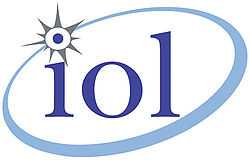University of New Hampshire InterOperability Laboratory
 | |
| Private | |
| Industry | Computer networking |
| Founded | 1988 |
| Headquarters | Durham, New Hampshire, U.S. |
Number of employees | 100+ |
| Website | iol.unh.edu |
The University of New Hampshire InterOperability Laboratory (UNH-IOL) provides independent, broad-based interoperability and standards conformance testing for data, telecommunications and storage networking products and technologies.[1] Combining extensive staff experience, standards bodies participation and a 32,000+ square foot facility, the UNH-IOL helps companies efficiently and cost effectively develop their products. More than 100 graduate and undergraduate student-employees from the University of New Hampshire work with full-time UNH-IOL staff,[2] gaining hands-on experience with developing technologies and products from hundreds of major companies.[3]
Mission
The UNH-IOL has a dual mission of providing a neutral environment to foster multi-vendor interoperability and conformance to data communications networking standards while educating students for future employment in the industry.[4]
History
The UNH InterOperability Laboratory (UNH-IOL) began as a branch of the University's Research Computing Center (RCC). In 1988 the RCC was testing Fiber Distributed Data Interface (FDDI) equipment with the intention of deploying it in its network. The RCC found that equipment from two vendors was not interoperable and contacted the vendors in an attempt to find a solution. After some debate the two vendors came together to solve the problem, which stemmed from differences between the draft and final versions of the FDDI specification. During the same time period the RCC was testing 10BASE-T Ethernet interfaces for another, unrelated project.
The RCC now had in-depth knowledge of both FDDI and 10BASE-T, and experience performing technical network testing. The university recognized the need for comprehensive interoperability testing of network equipment, and also the opportunity to educate its students in emerging technologies. Conceived with the vision of bringing together the collective resources of many companies in a vendor-neutral environment, the UNH-IOL began to develop common test beds, tools and methodologies, and was now uniquely positioned to provide testing services to companies, at a cost savings unattainable by any company or commercial laboratory. In addition, students now had the opportunity to work with the latest technologies and equipment and to engage the creators of those technologies directly. This model proved to be a win-win method, and in 1990 the first UNH-IOL Consortium was founded.
As its reputation for expertise in testing, procedural development and the interpretation of technical specifications grew, so did the UNH-IOL. This growth brought new technologies and equipment to the lab, providing more value for its members and more opportunities for its students.
The UNH-IOL is continually evolving with the computer networking industry and has worked with many technologies since its 10BASE-T and FDDI beginnings. Included in this list are Token Ring networks, IPv6, many varieties of Ethernet, Wireless communication, various flavors of DSL, and several network storage technologies.
While the core focus of the UNH-IOL has always been the development and execution of test suites and methodologies as well as the technical training of students, the lab has expanded its role in the industry. The UNH-IOL has been involved in industry trade shows and test events, operating booths and performing interoperability demonstrations at conferences such as SUPERCOMM, GLOBALCOMM, and TelcoTV. The lab also hosts group test events known as plugfests.
The UNH-IOL undertakes research and development projects and participates in many standards organizations, providing the industry as a whole with an experienced, neutral partner.
Consortia
The UNH-IOL’s consortia represent a collaboration of the industry leaders in network equipment, test equipment, industry forums and service providers to benefit each other by reducing expenses associated with research and development and quality assurance, providing trusted third-party verification, reducing product time to market and driving the industry acceptance of a technology. The UNH-IOL uses this collaborative testing model to distribute the cost of performing trusted, third-party testing and validation through an annual membership in each technology specific consortium. By bringing together the key players of networking technologies, the UNH-IOL provides a service that is critical to driving multi-vendor interoperability.
The UNH-IOL currently administers over twenty consortia and testing services, each involving a different technology:
- 10BASE-T Testing Service
- IEEE 1588
- 10 Gigabit Ethernet
- 40/100 Gigabit Ethernet
- Automotive Ethernet
- AVnu Testing Service
- Backplane Ethernet
- Bridge Functions
- Cable Testing
- Data Center Bridging
- Digital Living DLNA ICV
- DSL
- Fast Ethernet
- Fibre Channel
- GPON
- Gigabit Ethernet
- Home Networking
- IPv6
- iSCSI
- MIPI
- NVMe
- OpenFabrics Alliance Interoperability Testing
- Power over Ethernet
- Routing
- SAS
- SATA
- TR-069
- VoIP
- Wireless LAN
Over time, as interest in a particular technology fades (such as what happened with ATM and Token Ring), a consortium may be disbanded or converted into a testing service. Likewise, as interest in a new technology grows, a consortium may be founded in order to start testing devices of that type. Testing services are alternatives to consortia. They offer testing à la carte rather than through an annual membership fee.[5]
References
- ↑ http://www.iol.unh.edu/pressroom/Docs/UNH_IOL_final.pdf
- ↑ http://www.iol.unh.edu/contact/
- ↑ https://www.iol.unh.edu/general/members/
- ↑ http://www.iol.unh.edu/education/employment/
- ↑ https://www.iol.unh.edu/services/testing/
External links
- UNH-IOL
- Testing the Limits Blog featured on Test & Measurement World
- InterOp Insider Blog provides further insight into new developments at the UNH-IOL